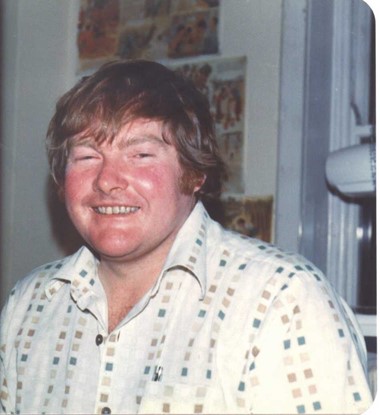There are very few people who qualify as unforgettable in your life, and Ted Wilshire was one of those for me. A larger than life character in every sense of the word, Ted was best known as the Research Officer for the Australian Metal Workers Union (AMWU) who penned the then-influential pamphlets Australia Ripped Off and Australia Uprooted in the days prior to The Accord under the Hawke and Keating Governments.
He passed away on Wednesday last week during an operation in Brisbane, and there will be a wake to celebrate his life at the Bayview Bar, 1st floor Woolloomooloo Bay Hotel, at 4pm this Thursday. If you knew Ted and you’d like to join the celebration, please let Alan Anderson know by sending an email to (spelling it out to avoid spambots) alananderson209 AT bigpond.com (the venue had to be changed from the Forest Lodge Hotel, because of the number who have already said they will attend).
Figure 1: Ted at my farewell from the Freedom from Hunger Campaign’s Ideas Centre in 1980, half his life ago

I first got to know Ted when he was a mature age student at Sydney University back in 1975, when the first Political Economy courses began. He was in his element in the vibrant and passionate University atmosphere of the mid-70s, and he provided an imposing bulk to the Political Economy Movement’s many demonstrations. Ten years apart in age, and a world apart in lifestyles—well, everyone was a world apart from Ted, because no-one could match his capacity to consume and party—we became firm friends.
Later he employed me, when he became the Director of the (pronounce the acronym) Business Union Consultation Unit—a seminar-organising group within the Department of Trade, established to improve Union-Business communication under The Accord.
We lost touch for a while when I resigned in 1987 to start my academic career, and after BUCU (later given the more bureaucratic name the Trade Development Council Secretariat) folded, and Ted moved to Queensland. But we got back in touch in the early 2000s’—Ted took the initiative—and I’ve visited “Club Ted” (as he aptly called his self-constructed and well-appointed home in Boondall) on several occasions since.
At least I think I did—it was always hard to remember a night out with Ted the next day!
I was always amazed that Ted lived as long as he did—his overconsumption of cigarettes and alcohol (and other intoxicants) was deservedly legendary. But he had such a life force in him that he made it to 71, living far longer than most people thought he would. And for a while, he had a strong impact on the economic debate in Australia (and internationally), before the finance sector derailed everything.
He could be an intimidating presence—his huge personality, along with his bulk, guaranteed that. But he was at his heart a loving and generous soul, and full of boisterous bonhomie. I knew no-one who could party like him, nor cook as good a meal, nor build as grand an abode when he put on his worker’s boots.
If anyone lived Dylan Thomas’ adage to “Rage, rage against the dying of the light”, it was Ted. And of all the verses of this great poem, one stands out as the template of Ted’s life:
Wild men who caught and sang the sun in flight,
And learn, too late, they grieved it on its way,
Do not go gentle into that good night.
Goodbye, old friend. I hope to see many more of your old friends at The ‘Loo on Thursday. There will indeed be a rage for Ted.
Do not go gentle into that good night
Do not go gentle into that good night,
Old age should burn and rave at close of day;
Rage, rage against the dying of the light.
Though wise men at their end know dark is right,
Because their words had forked no lightning they
Do not go gentle into that good night.
Good men, the last wave by, crying how bright
Their frail deeds might have danced in a green bay,
Rage, rage against the dying of the light.
Wild men who caught and sang the sun in flight,
And learn, too late, they grieved it on its way,
Do not go gentle into that good night.
Grave men, near death, who see with blinding sight
Blind eyes could blaze like meteors and be gay,
Rage, rage against the dying of the light.
And you, my father, there on the sad height,
Curse, bless, me now with your fierce tears, I pray.
Do not go gentle into that good night.
Rage, rage against the dying of the light.

